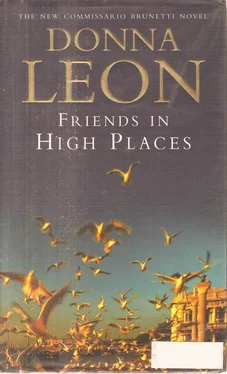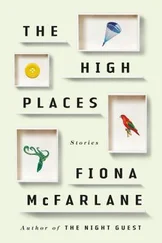The agreement of the others with Bonsuan’s sentiments was no less strong for remaining unspoken. Together, they turned from the boat and walked back toward the campo, a part of the city Brunetti seldom visited. He and Paola used to eat in a small fish restaurant over here, but it had changed hands a few years ago, and the quality of the food had rapidly deteriorated, so they’d stopped coming. Brunetti had had a girlfriend who lived over here, but that had been when he was still a student, and she had died some years ago.
They crossed the bridge and walked through Campo San Sebastiano, toward the large area of Campo Angelo Raffaele. Vianello, leading the way, turned immediately into a calle on the left, and up ahead they saw the scaffolding attached to the façade of the last building in the row, a four-storey house that looked as if it had been abandoned for years. They studied the signs of its emptiness: the leprous paint peeling away from the dark green shutters; the gaps in the marble gutters that would allow water to pound down on to the street and probably into the house itself; the broken piece of rusted antenna hanging out a metre from the edge of the roof. There was, at least for people born in Venice – which means born with an interest in the buying and selling of houses – an emptiness about the house which would have registered on them even if they had not been paying particular attention.
As far as they could tell, the scaffolding was abandoned: all the shutters were tightly closed. There was no evidence that work was being conducted here, nor was there any sign that a man had injured himself fatally, though Brunetti was not at all sure how he thought that fact would be indicated.
Brunetti stepped back from the building until he was leaning against the wall of the one opposite. He studied the entire façade, but there was no sign of life. He crossed the calle, turned, and this time studied the building that faced the scaffolding. It too showed the same signs of abandonment. He looked to his left: the calle ended in a canal, and beyond it was a large garden.
Vianello had, at his own pace, duplicated Brunetti’s actions and had given the same attention to both buildings and to the garden. He came and stood next to Brunetti. ‘It’s possible, isn’t it, sir?’
Brunetti nodded in acknowledgement, and thanks. ‘No one would notice a thing. There’s no one in the building that looks across at the scaffolding, and there’s no sign that anyone is taking care of the garden. So there was no one to see him fall,’ he said.
‘If he fell,’ Vianello added.
There was a long pause, and then Brunetti asked, ‘Do we have anything on it?’
‘Not that I know of. It was reported as an accident, I think, so the Vigili Urbani from San Polo would have come over to have a look. And if they decided that it was, an accident, I mean, that would have been the end of it.’
‘I think we’d better go and talk to them,’ Brunetti pushed himself away from the wall and turned to the door of the house. A padlock and chain were attached to a circle of iron set into the lintel to hold the door to the marble frame.
‘How did he get inside to get up on the scaffolding?’ Brunetti asked.
‘Maybe the Vigili can tell us that,’ Vianello said.
* * * *
They couldn’t. Bonsuan took them over in the boat, up the Rio di San Agostino to the police station near Campo San Stin. The policeman at the door recognized them both and took them at once to Lieutenant Turcati, the officer in charge. He was a dark-haired man whose uniform seemed to have been made for him by a tailor. This was enough for Brunetti to treat him with formality and address him by rank.
When they were seated and after listening to what Brunetti had to say, Turcati had the file on Rossi brought up. The man who called about Rossi had also called for an ambulance after phoning the police. Because the much-nearer Giustiniani had no ambulances available, Rossi had been taken to the Ospedale Civile.
‘Is he here? Officer Franchi?’ Brunetti asked, reading the name at the bottom of the report.
‘Why?’ the lieutenant asked.
‘I’d like him to describe a few things to me,’ Brunetti answered.
‘Like what?’
‘Why he thought it was an accident. Whether Rossi had keys to the building in his pocket. Whether there was blood on the scaffolding.’
‘I see,’ the lieutenant said, and reached for his phone.
While they waited for Franchi, Turcati asked if they would like coffee, but both men refused.
After a few minutes of idle talk, a young policeman came in. He had blond hair cut so short as almost not to be there and looked barely old enough to need to shave. He saluted the lieutenant and stood to attention, not looking at either Brunetti or Vianello. Ah, that’s the way Lieutenant Turcati runs his shop, Brunetti thought.
‘These men have some questions for you, Franchi,’ Turcati said.
The policeman stood a bit more easily, but Brunetti saw little evidence that he had relaxed.
‘Yes, sir,’ he said but still did not look towards them.
‘Officer Franchi,’ Brunetti began, ‘your report on the finding of the man over near Angelo Raffaele is very clear, but I have a few questions I’d like to ask you about it.’
Still facing the lieutenant, Franchi said, ‘Yes, sir?’
‘Did you search the man’s pockets?’
‘No, sir. I got there just as the men from the ambulance did. They picked him up and put him on a stretcher and were taking him toward the boat.’ Brunetti did not ask the policeman why it had taken him the same time to travel the short distance from the police station as for the ambulance to cross the entire city.
‘You wrote in your report that he had fallen from the scaffolding. I wondered if you examined the scaffolding to see if there were signs of that. Perhaps a broken board or a piece of fabric from his clothing. Or perhaps a bloodstain.’
‘No, sir.’
Brunetti waited for an explanation, and when it didn’t come, he asked, ‘Why didn’t you do that, officer?’
‘I saw him there on the ground, next to the scaffolding. The door to the house was open, and when I opened his wallet, I saw that he worked in the Ufficio Catasto, so I just figured he was there on a job.’ He paused and, into Brunetti’s silence, added, ‘If you see what I mean, sir.’
‘You said he was being carried to the ambulance by the time you got there?’
‘Yes, sir.’
‘Then how was it you had his wallet?’
‘It was on the ground, sort of hidden by an empty cement bag.’
‘And where was his body?’
‘On the ground, sir.’
Keeping his voice level, Brunetti asked patiently, ‘Where was his body in relation to the scaffolding?’
Franchi considered the question and then answered, ‘To the left of the front door, sir, about a metre from the wall.’
‘And the wallet?’
‘Under the cement bag, sir, as I told you.’
‘And when did you find it?’
‘After they took him to the hospital. I thought I should have a look around, so I went inside the house. The door was open when I got there, as I wrote in the report. And I’d already seen that the shutters just above where he was lying were open, so I didn’t bother to go upstairs. It was when I came out that I saw the wallet lying there, and when I picked it up, there was an identification card from the Ufficio Catasto, so I assumed he was there to check on the building or something like that.’
‘Was there anything else in the wallet?’
‘There was some money, sir, and some cards. I brought it all back here and put it in an evidence bag. I think that’s listed in the report.’
Brunetti turned to the second page of the report and saw that mention of the wallet was made.
Читать дальше











